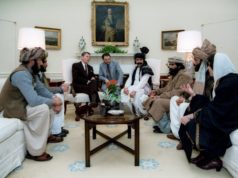Afghan President Hamid Karzai and his national security council accused the U.S. and coalition forces Sunday of deliberately withholding fuel supplies from the Afghan army. Karzai contends Washington is trying to apply undue pressure on Afghan leaders to sign a new security agreement. U.S. officials and the NATO-led International Security Assistance Force (ISAF) denied that any supplies had been cut. Karzai’s accusation highlights the growing tension between Afghanistan’s President and the Obama administration over the status of U.S. forces in Afghanistan after 2014.
Despite agreeing weeks ago to the proposed Bilateral Security Agreement (BSA), Karzai has refused to sign it. The BSA would allow the U.S. to maintain thousands of troops in Afghanistan after combat operations end in 2014 for training and counterterrorism missions. Last week, Karzai rejected the final recommendation from his own assembly of Afghan tribal leaders, a Loya Jirga, that he should sign the security agreement by the end of the year. Karzai told the Jirga, which he had proclaimed would have the final word on the security deal, that he wanted to wait until after the Afghan presidential elections next spring.

A file photo of Afghanistan’s President Hamid Karzai in 2010. (Photo: Getty) |
In a visit last week with U.S. National Security Adviser Susan E. Rice, Karzai also insisted he would not sign the deal until new conditions were met. The Afghan President demanded an immediate end to military raids on Afghan homes, help in launching peace talks with Taliban insurgents, and the release of 17 Afghan prisoners from the U.S. detention center in Guantanamo Bay, Cuba. Karzai added the reduction of drone strikes to his list of new demands when a U.S. drone strike accidentally killed a two-year-old child in Helmand province Thursday.
The Obama administration and NATO partners responded to the new conditions with a statement saying that if the agreement is not signed by the end of 2013, U.S. forces will fully withdraw from Afghanistan by the end of 2014. American troops still make up the majority of NATO’s 75,000 troops in Afghanistan, down from the 100,000 soldiers in 2009. The Afghan military could lose billions of dollars in funding from the U.S. over the next few years if a full withdrawal occurs, jeopardizing Afghanistan’s ability to defend itself from Taliban attacks.





